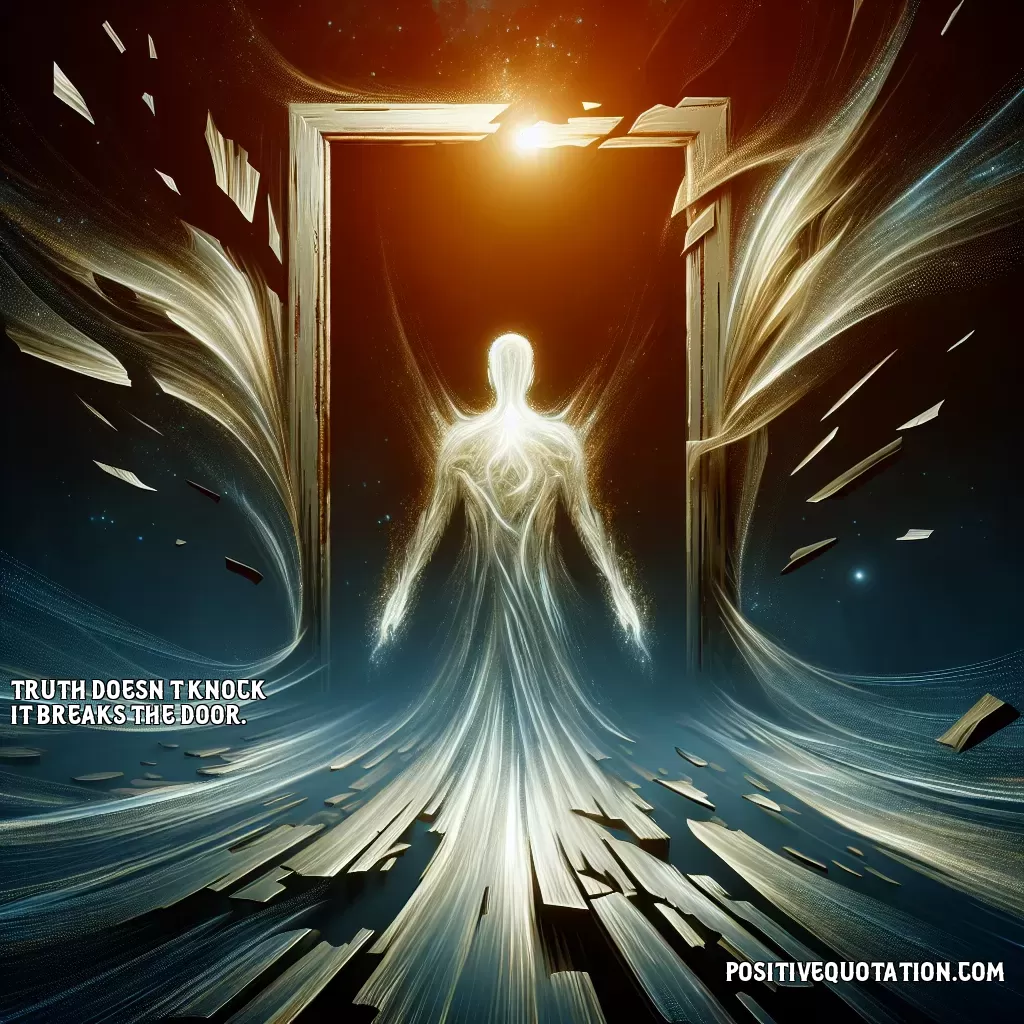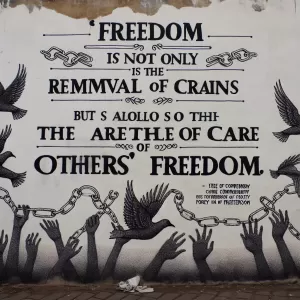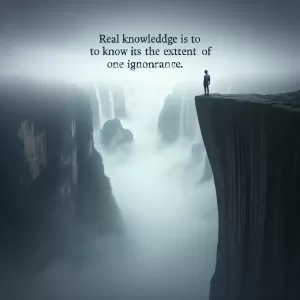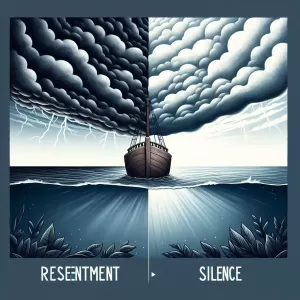
Truth doesn’t knock it breaks the door.
Author: Gwendolyn Brooks
👁️ 22 views
The quote "Truth doesn’t knock, it breaks the door" suggests that truth is powerful, undeniable, and often arrives with an impact that is both sudden and forceful. Unlike someone who knocks at a door, waiting patiently to be let in, truth does not require permission or an invitation to enter our conscious awareness or lives. Instead, it bursts in unannounced, shattering any barriers or illusions we might have constructed to keep it at bay. This compelling metaphor implies that truth has an inherent force that cannot be restrained or ignored. It challenges our comfort zones and requires us to confront reality, often disrupting the walls of denial, deception, or misunderstanding that we might have erected. The notion that truth "breaks the door" highlights its capacity to dismantle falsehoods and bring clarity, often in a sudden and jarring manner. Furthermore, the quote underscores the inevitability of truth, suggesting that no matter how much one attempts to ignore it or hide from it, truth will eventually make itself known. Its unyielding nature insists on recognition and acknowledgment, compelling individuals and societies to deal with it, regardless of their readiness. When truth "breaks the door," it compels action and transformation, urging those it confronts to reassess their beliefs, decisions, and situations. In essence, this quote encapsulates the undeniable and transformative power of truth, illustrating how it disrupts complacency and demands attention, reflection, and sometimes, profound change.
Quote By: Gwendolyn Brooks

Mandela: Freedom is not only the removal of chains but also the care for othe...
👁️ 86 views
Author:
Nelson Mandela
#unique quotes on life

Wounds inflicted by loved ones don't heal because they knew exactly where to ...
👁️ 72 views
Author:
Nikita Gill
#unique quotes on life

If you are neutral in situations of injustice, you have chosen the side of th...
👁️ 71 views
Author:
Desmond Tutu
#unique quotes on life

Real knowledge is to know the extent of one’s ignorance. – Confucius
👁️ 65 views
Author:
Confucius
#unique quotes on life

Chekhov: If a person takes care of their own health, it's hard to find a doct...
👁️ 64 views
Author:
Anton Chekhov
#unique quotes on life

The crowd shows submissive respect toward power. Kindness affects them too, b...
👁️ 64 views
Author:
Friedrich Nietzsche
#unique quotes on life

Anybody can be good in the countryside. There are no temptations there. – Osc...
👁️ 63 views
Author:
Oscar Wilde
#unique quotes on life

The silence after a deep resentment is worse than the resentment itself.
👁️ 59 views
Author:
Marty Rubin
#unique quotes on life
Gwendolyn Brooks, born on June 7, 1917, in Topeka, Kansas, and raised in Chicago, Illinois, is celebrated as one of America's most distinguished poets. Distinguished for her ability to articulate the complexities of the African American experience, Brooks was the first African American to win a Pulitzer Prize for Poetry in 1949 for her collection "Annie Allen." Her works are characterized by a profound understanding of the lives of ordinary people and an innovative use of language that captures the essence of urban life.
Brooks’ poetry often draws from her own experiences and the vibrant culture of Chicago, where she became a prominent figure in the literary scene. She began writing at a young age, and by the time she was in her twenties, Brooks had already published two poetry collections: "A Street in Bronzeville" (1945) and "Annie Allen" (1949), the latter earning her the Pulitzer Prize. This was a groundbreaking achievement not just for Brooks but also for African American literature, as it opened doors for many writers who came after her.
Throughout her career, Gwendolyn Brooks was deeply engaged with social issues, particularly those concerning race and identity. Her poetry evolved over the years; while her early work often reflected the struggles and joys of urban African American life, her later poems took on more experimental forms, showcasing her innovative spirit and willingness to explore new territories in her poetry. Brooks was also an influential educator, teaching at various institutions, including the University of Wisconsin-Madison and Columbia College Chicago, where she inspired countless students to engage with poetry.
Gwendolyn Brooks received numerous awards and honors throughout her career, including being named the Poet Laureate of Illinois in 1968. Her legacy extended beyond her lifetime, influencing generations of poets and writers. Brooks passed away on December 3, 2000, but her work continues to resonate, inviting readers to explore the depth and richness of human experience through her keenly observed verses. Gwendolyn Brooks remains a vital voice in American literature, celebrated for her unique perspective and unwavering commitment to the art of poetry.